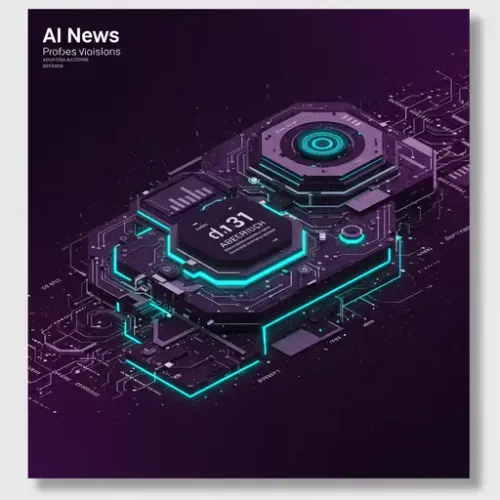How Wisconsin teachers are navigating artificial intelligence use, in and out of the classroom

The AI Report
Daily AI, ML, LLM and agents news
Navigating the AI Frontier: How Wisconsin Educators are Shaping the Future of Learning
Artificial intelligence (AI) is rapidly transforming various sectors, and education is no exception. As AI tools become more sophisticated and accessible, teachers across Wisconsin are grappling with the opportunities and challenges they present in the classroom. Far from resisting this technological wave, many innovative educators are embracing AI as the next natural evolution in teaching, seeking to harness its power while preserving the invaluable human element of learning.
Embracing Innovation: AI as an Ally, Not an Adversary
For seasoned educators like Mark Acherman, a science teacher at Darlington Elementary/Middle School and a 2026 Wisconsin Teacher of the Year, the advent of AI is simply another chapter in a long history of technological integration. Having witnessed the widespread adoption of computers, the internet, and smartphones in schools over his 30-year career, Acherman views AI as a powerful tool that can enhance creativity and engagement in the classroom. His approach exemplifies how technology can free teachers to focus on deeper, more interactive learning experiences.
Acherman actively uses an AI tool called Curipod to develop dynamic lesson plans for his fifth- and sixth-grade students. This platform allows for interactive responses where students can vote on the best answers, fostering critical thinking and creative expression. Furthermore, Curipod provides immediate analysis of student writing, suggesting areas for improvement and offering personalized feedback that might otherwise be time-consuming for teachers to deliver manually. This innovative use of AI not only streamlines the pedagogical process but also pushes students to refine their work and engage more deeply with the material.
Beyond Memorization: Fostering Depth of Knowledge with AI
Another exemplary educator, Brian Counselman, a science teacher at Malcolm Shabazz City High School in Madison and a 2025 Wisconsin Teacher of the Year, shares a similarly forward-thinking perspective. Teaching at an alternative school focused on project-based learning, Counselman understands the power of technology to motivate students. He argues that instead of avoiding AI, educators should lean into it, seeing it as a healthy challenge that compels teachers to create more authentic learning moments.
Counselman emphasizes the importance of advancing students' “depth of knowledge.” This goes beyond mere memorization of facts to truly understanding how ideas work, why they exist, and how they can be applied in various contexts. In his view, AI tools can handle the factual recall, thereby freeing up valuable classroom time for students to engage in higher-order thinking, problem-solving, and collaborative projects. He notes that the real value lies in assessing students through self-reflection and their ability to synthesize concepts by applying them to personal experiences. This crucial distinction highlights AI's limitations: while it can process information, it cannot replicate or reflect on a student's lived experience or genuine engagement.
The Essential Balance: AI for Efficiency, Human Connection for Insight
The core message from both Acherman and Counselman is the necessity of striking a thoughtful balance. AI offers undeniable benefits, from streamlining lesson preparation and providing immediate feedback to making learning more interactive and motivating. However, it cannot replace the critical role of real-life experiences, face-to-face interactions, and the nuanced process of personal reflection that are vital for true understanding and growth.
In classrooms across Wisconsin, teachers are learning to leverage AI as a powerful assistant, allowing them to redirect their energy towards fostering authentic engagement, critical thinking, and the development of deeper conceptual understanding. This approach transforms AI from a potential disruptor into a valuable partner in delivering a richer, more meaningful educational experience. By doing so, they are not only preparing students for a future increasingly shaped by AI but also reinforcing the irreplaceable value of human connection and experiential learning.
Practical Takeaways for Educators:
- Embrace, Don't Evade: View AI as an opportunity to innovate and enhance teaching methods, rather than a threat to traditional education.
- Focus on Depth: Shift the emphasis from rote memorization to fostering a deeper understanding of concepts, knowing AI can handle factual recall.
- Integrate Interactive Tools: Explore AI-powered platforms that can make lessons more engaging, provide instant feedback, and encourage student creativity.
- Prioritize Real-World Experiences: Intentionally design learning activities that require hands-on engagement, face-to-face collaboration, and application of knowledge in authentic contexts.
- Cultivate Self-Reflection: Encourage students to reflect on their learning journey and how new concepts connect to their personal experiences, as this is where human insight truly shines beyond AI's capabilities.
As AI continues to evolve, the most successful educators will be those who skillfully integrate these technologies to elevate the human aspects of learning, creating dynamic environments where students are not just consumers of information, but active, reflective participants in their own educational journey.

The AI Report
Author bio: Daily AI, ML, LLM and agents news
